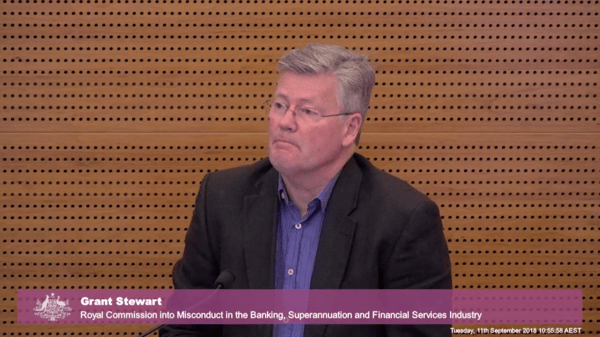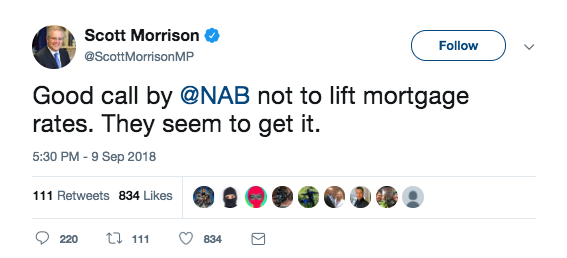When showing heart is both human and smart crisis communication.
Crisis Management Royal Commission Watch - Part 5

This week in numbers:
- 8-9 months: the time Freedom’s Craig Orton and TAL’s Loraine Van Eeden have been in their roles
- 3,297: number of online articles mentioning the Commission this week, the most since April 30th (Round 2)
- 18 minutes: the time it took Freedom to sell a young man with Down Syndrome three insurance policies
From a dry Round 5 of hearings on Superannuation, the Royal Commission into Misconduct in the Banking, Superannuation and Financial Services Industry is back with what many consider to be the worst week to date, including “the most shocking case yet”, which the Prime Minister called “despicable”. One journalist called this round “the nastiest, grubbiest, segment…unscrupulous, immoral, unbelievable.”
Matters of the heart: when in doubt, be human
On the stand this week were:
- A young man with Down Syndrome who was sold three policies over the phone;
- A nurse driven to thoughts of self-harm by her insurer’s eight year claims battle;
- A woman whose claim for breast surgery was denied because it wasn’t a complete mastectomy;
- A paraplegic whose superfund informed her insurer that she was ineligible due to a low super balance.
The ABC also profiled a widowed mother who described her husband’s exhaustive fight with insurers as causing him to give up hope, amongst other sad stories.
Emotions are running high.
And they’ve brought considerations of ‘heart’ and ‘soul’ to the fore this week, not just because of the heart attack case study.
“When a man's an empty kettle he should be on his mettle, And yet I'm torn apart.
Just because I'm presumin' that I could be kind-a-human, If I only had heart.”
In the Wizard of Oz, the Tin Woodman represents how people see industry – running on oil instead of blood, hollow and heartless.
It’s our worst fear about the services and safety nets that have profound effects on our lives: the medical system, the legal system, and products like insurance. There is this underlying anxiety that, if we have a heart attack or find a cancer, our insurer will find some way not to pay out.
And it’s that fear which made this week’s stories so resonant. Fear that gave rise to views of a “horror fortnight” of “horror hearings”, a “horror show” or “ongoing horror story”, with “nightmarish” “horror tales” of “hidden nasties” and “zombie policies”. Zombies were once human, but have lost their humanity and no longer recognise others as human. This is the charge that has been implicitly aimed at the industry.
Adele Ferguson said that this week’s hearings led to the “heartless core of CBA's insurance business laid bare”. Meanwhile, New Zealand’s Financial Markets Authority CEO urged the sector to focus on building trust, as consumers still don’t believe that “financial services firms operate with their best interests at heart”.
“Have some faith in the long-term power of trust and the differentiator that trust and fairness will be. You know it makes sense."
On this wave of sentiment, even the mortgage rate hikes by CBA, ANZ and Westpac were seen as “heartless”.
It’s understandable and reasonable that we, as a nation, reacted with horror to these stories. They speak to our worst and most personal fears. But it doesn’t make us heartless to also dissect these examples – in fact, we feel strongly that it’s important to face and learn from some of the most confronting effects of financial sector conduct. As people who work in banking, superannuation, insurance, asset management, and financial planning, there are important lessons in terms of crisis and issues communication, as well as ethical conduct, to be taken from these painful experiences.
This week, our thesis is that having – and showing – empathy is both decent, and strategic as a communication response.
The right response to accusations of heartlessness is to empathise and actively demonstrate the reverse. To the father of the young man with Down Syndrome, Freedom’s Craig Orton apologised for their experiences “from the bottom of his heart”. About his previous opposition to the Commission, ScoMo admitted he had “failed…to properly understand the real pain people had been feeling about being treated so badly”, to understand “that Australians needed to work through the deep hurt they've had on this."
In the face of public perception of an absence of humanity, it’s rarely a bad call to demonstrate its presence. It may seem intuitive, but it’s not always the response that business has.
More widely speaking, the last few decades have seen a strong trend back towards looking for the “heart” in business. We know that consumers, especially millennial ones, want their spending and investing to be ethical, from their socks to their superfunds. And it has been shown that good ESG is just good investment.
Like the Tinman, insurance needs to go looking for its heart.
Calculating the true costs in decision-making
While the other three majors raised their mortgage rates, NAB kept its rates on hold. NAB was surprisingly open about the rationale behind this:
“What we’re doing with our existing customers, our existing mortgage customers, is really wrapping our arms around them and thanking them for doing business with us.
“If we can start to rebuild trust and greater advocacy and loyalty with those customers, that becomes a really virtual cycle where they do more business with us, they feel better about banking with us, they recommend us to their family and friends.
“We’ve got to show by action that we’re listening and we’re moving forward to re-earn people’s trust again.”
It was a demonstration of multi-disciplinary decision-making. NAB are prepared to take a short-term financial hit for longer-term gain. Not a new concept. But a decision that wouldn’t have been taken though a P&L lens only: in so many of these business decisions, whether in crisis or not, the financial lens needs to be overlaid by legal and communications lenses to ensure we are looking beyond the ends of our noses.
Sydney Morning Herald pointed out that this “clever public relations move…will probably cost the bank between $10 million and $15 million a month. In the scheme of NAB’s $6.6 billion profit last year, it's not a big deal” – and clearly considered well-worth the goodwill it is intended to buy back.

APRA’s CBA report made clear that financial concerns are not the only, or most important, considerations when running a bank. Risk management in particular must be looked at through a much broader lens than that of dollars – one that dials up the importance of non-financial risks, among them culture and conduct risks, and reputation. The same is surely true of insurers given the critical role they play at the most distressing times of our lives.
In the Commission this week it seemed as though many of the insurers that took the stand made decisions driven by a short-term bottom line – decisions that ended up being extremely costly, both in terms of tangible dollar price and intangible reputation damage.
For example, we saw cases this week of insurers sticking by outdated medical decisions or refusing to pay certain claims: e.g. CommInsure not paying out due to the ‘severity’ of a heart attack or ‘radical’-ness of a surgery, or TAL not paying for an anxiety claim. It saved them tens of thousands in the (very) short-term, as well as, potentially, the cost of further claims. But it cost them far more overall. These costs would have been factored in if a social licence, PR or communications perspective was taken, in addition to the legal and financial ones.
The Aus put it well when it said that “banks risk all by neglecting to protect their reputation”, and pointed to the examples of enforceable undertakings and class action settlements as incurred short-term costs that nonetheless often pay longer-term dividends.
“It is the feared change in community perception, the continued revisiting of alleged wrongdoing in the media during drawn-out legal proceedings, that drives companies away from proving the regulator wrong in a courtroom.”
In other words, business decisions must consider both today’s bottom line and a public relations-informed calculation of potential longer-term costs. Something that seems oft forgotten.
The clean sheet defence: using the circuit breaker tactic
Outside of the focus on the heart, there was an interesting secondary theme this week of cleanliness and purity. The Commission has shown the industry, and specific entities in particular, to be in something of a mess, and this week the media highlighted the grubbiness of Australian life insurance’s dirty laundry.
The hearings opened with a “laundry list of misconduct”, while the AFR wrote that “the mud flowing out” of the Commission would further erode trust.
“Time for life insurance to get rid of the filth”, wrote Tony Boyd, saying Hayne “should have ordered a pair of gumboots for [Orr]…to protect her from the disgusting mess inside the Augean stables…The filth has been piling up for decades.” Others “should probably exit with haste even if their sales practices are squeaky clean” Boyd opined. The previous hearings into super had shown “‘too many snouts in the trough” said Nationals Senator John Williams in a porcine twist, but they “scraped off a truckload of dirt” that saw “plenty of muck come off”.
Meanwhile, Freedom’s new Craig Orton was brought in to “start cleaning up the messes”. Plausible deniability is something that has come up repeatedly, and nothing is more plausible than simply not having been there yet.
In part, Freedom’s Craig Orton was able to convincingly take the position he did because he was shiny and new. That he was clean of previous actions and decisions meant he could wholeheartedly apologise, talk about things being totally unacceptable, and promise reviews of the business, saying “That will not happen under my watch”. There's nothing like a clean break.
And find out more about the ‘circuit breaker’ here – one in a series of nine communication strategies for slowing, halting or reversing a crisis we are sharing through a series of short videos and blogs.











